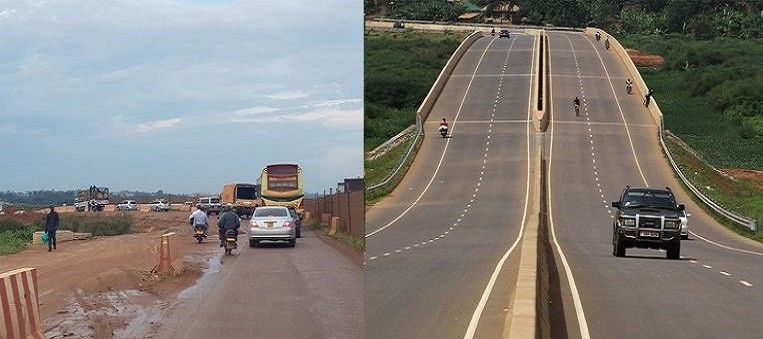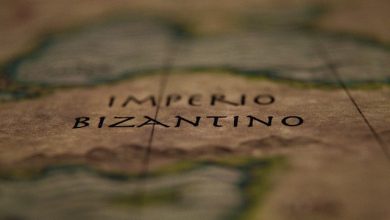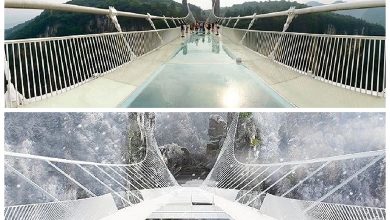Find the differences: a road in Uganda laid out by China or by Europe

Both China and the European Union are investing billions in Africa on the hunt for more influence on the continent but their conditions are quite different. This becomes clear in Uganda where both superpowers have constructed an asphalt road.
Anyone who lands at the airport in the Ugandan city of Entebbe can whiz over the brand new ‘Chinese’ highway to the capital Kampala. A modern four-lane road of over 35 kilometres recently connects the cities. The Entebbe-Kampala Expressway must ease the pressure on the existing connection, an old slab of asphalt without road markings and with traffic jams.
The ‘Entebbe-Kampala Expressway’ is a textbook example of the Sino-African cooperation in the field of infrastructure. The cooperation is changing the face of Africa and last week again got a boost from China’s commitment of 60 billion dollars in financial resources. The money is for extra roads, bridges, railways, airports and ports, from Botswana to Benin and from Kenya to Cameroon.
When the motorist approaches Kampala from Entebbe via the new ‘Chinese’ highway, a symbolic crossroads awaits him. The new route connects to a metropolitan ring road that came with money from that other partner: the EU. Where the two roads touch each other, at a swamp with papyrus plants, the asphalt is uneven, as a kind of sign of the cooperation and the competition between East and West with their quest for influence in Africa, which nowadays has more to choose.
What are the differences between the two partners? Ugandans are ‘in summary’ concerned about the consequences of the ‘Chinese’ approach to national debt, and such as corruption, but happy about the speed at which the Chinese are delivering.
1) Donation or loan
The Entebbe-Kampala Expressway is funded with a Chinese loan of $350 million and over $100 million Ugandan money. The road surface, including a branch of 14 kilometres, is 51 kilometres long. “Insane” is expensive according to economist Fred Muhumuza, even if it is a four-lane road with one-and-a-half-kilometre increase above a wetland. Uganda’s audit office points out that the costs are relatively higher than for a complex six-lane road in Ethiopia that was built by the same construction company, the China Communications Construction Company (CCCC).
The Chinese loan has reportedly soft repayment terms. Uganda’s total debt, according to the IMF, is still below the recommended upper limit of 50 percent, at around 42 percent of GDP. But the debt is increasing rapidly, not least via China, now Uganda’s largest source of foreign loans. Chinese credit is also intended for the upgrading of Uganda’s airport and a dam in the Nile. Since 2006, when Uganda, like other African countries, had a large debt cancellation of the IMF and the World Bank, the external debt has increased by 4.5 times. Uganda’s central bank warns of risks: the loans must be repaid in foreign currencies. Uganda buys hard currency with its own shilling, the value of which can go down quite a bit, like so many African currencies. The Ugandan shilling is now worth one third less than five years ago.
The EU-co-financed ring road at Kampala is 21 kilometres long and almost completely dual. The road opened in 2009 and the EU cost around 50 million euros. The ring road is currently being widened to four lanes. The EU is making 52 million euros available for this purpose. First name point: more than half of this amount is a gift. That part does not come up on Uganda’s debt.
2) Whether or not a tender
One reason why the new Chinese highway is so expensive, says Uganda’s audit office, is that the building contract was not distributed after a competitive tendering process. It just went to CCCC. Details of the chord are scarce. CCCC may also take care of the new construction of the national airport. Red deposits with ‘CCCC’ are located next to the runway in Entebbe, opposite the terminal where once a large text welcomed visitors to the ‘pearl’ of Africa, a nickname for Uganda that was coined by Winston Churchill, the leader of former colonizer Great Britain.
Chinese loans for construction projects in Africa usually have the condition that a Chinese construction company is hired. The opaque approach fosters the fear of deliberate cost inflation, and thus corruption. Uganda’s government at one point claimed that a railroad still to be built would cost at least $1.5 billion more than was estimated by the Chinese company that wanted to build the track.
The EU does employ public tenders. The first phase of the ring road around Kampala was built by construction company Salini from Italy. The current expansion is provided by the Portuguese Mota-Engil. Conditions that companies must comply with are, for example, environmental regulations, a maximum number of working hours per day and measures to prevent HIV infections, such as making condoms available in the vicinity of the workplace.
3) Case of short or long breath
The consequence of all circumstances is that the Chinese highway in Uganda was relatively fast. The construction took six years. That comes down to a year’s delay. The first phase of the ‘European’ ring road at Kampala lasted five years: three years’ delay. Prior to that construction, a feasibility study was also carried out that lasted a few years.
EU progress reports from the time of construction of the ring road exasperate. The Italian construction company Salini quarrelled with the French engineering company that had made the design after which a British research company had to come and mediate. The current expansion of the ring road is also showing considerable delays. A Nigerian company that had lost the tendering for the expansion, filed a lawsuit. And an environmental impact report mentions the potentially detrimental consequences of the expansion for the gray head, the red-eye root and the blue long-tailed starling rules, which the Chinese CCCC has less problems with.
Chauffeur Musa regularly transports customers between Kampala and the airport in Entebbe. He summarizes his feelings about the new highway: “Good thing that has happened, I now drive back and forth much faster. That’s what the Chinese have done nicely. It is a pity that my two sons also have to pay the costs for the reimbursement later, Europe just gives money.”





Incredible points. Sound arguments. Keep up the good effort.